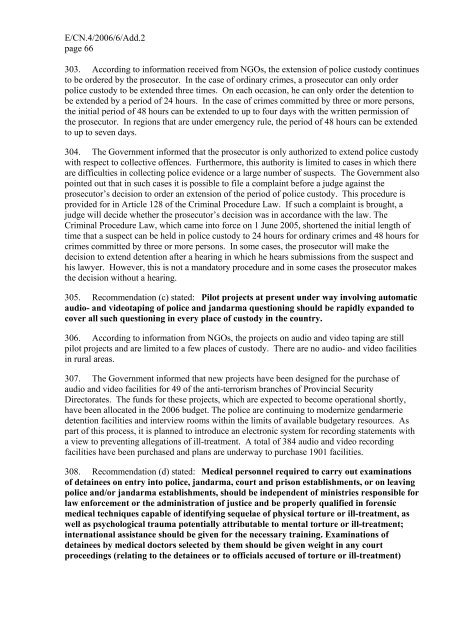E Economic and Social Council - acnudh
E Economic and Social Council - acnudh
E Economic and Social Council - acnudh
Create successful ePaper yourself
Turn your PDF publications into a flip-book with our unique Google optimized e-Paper software.
E/CN.4/2006/6/Add.2<br />
page 66<br />
303. According to information received from NGOs, the extension of police custody continues<br />
to be ordered by the prosecutor. In the case of ordinary crimes, a prosecutor can only order<br />
police custody to be extended three times. On each occasion, he can only order the detention to<br />
be extended by a period of 24 hours. In the case of crimes committed by three or more persons,<br />
the initial period of 48 hours can be extended to up to four days with the written permission of<br />
the prosecutor. In regions that are under emergency rule, the period of 48 hours can be extended<br />
to up to seven days.<br />
304. The Government informed that the prosecutor is only authorized to extend police custody<br />
with respect to collective offences. Furthermore, this authority is limited to cases in which there<br />
are difficulties in collecting police evidence or a large number of suspects. The Government also<br />
pointed out that in such cases it is possible to file a complaint before a judge against the<br />
prosecutor’s decision to order an extension of the period of police custody. This procedure is<br />
provided for in Article 128 of the Criminal Procedure Law. If such a complaint is brought, a<br />
judge will decide whether the prosecutor’s decision was in accordance with the law. The<br />
Criminal Procedure Law, which came into force on 1 June 2005, shortened the initial length of<br />
time that a suspect can be held in police custody to 24 hours for ordinary crimes <strong>and</strong> 48 hours for<br />
crimes committed by three or more persons. In some cases, the prosecutor will make the<br />
decision to extend detention after a hearing in which he hears submissions from the suspect <strong>and</strong><br />
his lawyer. However, this is not a m<strong>and</strong>atory procedure <strong>and</strong> in some cases the prosecutor makes<br />
the decision without a hearing.<br />
305. Recommendation (c) stated: Pilot projects at present under way involving automatic<br />
audio- <strong>and</strong> videotaping of police <strong>and</strong> j<strong>and</strong>arma questioning should be rapidly exp<strong>and</strong>ed to<br />
cover all such questioning in every place of custody in the country.<br />
306. According to information from NGOs, the projects on audio <strong>and</strong> video taping are still<br />
pilot projects <strong>and</strong> are limited to a few places of custody. There are no audio- <strong>and</strong> video facilities<br />
in rural areas.<br />
307. The Government informed that new projects have been designed for the purchase of<br />
audio <strong>and</strong> video facilities for 49 of the anti-terrorism branches of Provincial Security<br />
Directorates. The funds for these projects, which are expected to become operational shortly,<br />
have been allocated in the 2006 budget. The police are continuing to modernize gendarmerie<br />
detention facilities <strong>and</strong> interview rooms within the limits of available budgetary resources. As<br />
part of this process, it is planned to introduce an electronic system for recording statements with<br />
a view to preventing allegations of ill-treatment. A total of 384 audio <strong>and</strong> video recording<br />
facilities have been purchased <strong>and</strong> plans are underway to purchase 1901 facilities.<br />
308. Recommendation (d) stated: Medical personnel required to carry out examinations<br />
of detainees on entry into police, j<strong>and</strong>arma, court <strong>and</strong> prison establishments, or on leaving<br />
police <strong>and</strong>/or j<strong>and</strong>arma establishments, should be independent of ministries responsible for<br />
law enforcement or the administration of justice <strong>and</strong> be properly qualified in forensic<br />
medical techniques capable of identifying sequelae of physical torture or ill-treatment, as<br />
well as psychological trauma potentially attributable to mental torture or ill-treatment;<br />
international assistance should be given for the necessary training. Examinations of<br />
detainees by medical doctors selected by them should be given weight in any court<br />
proceedings (relating to the detainees or to officials accused of torture or ill-treatment)
















